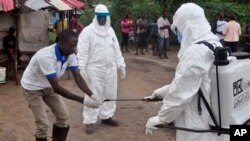This week, Liberia could be declared Ebola-free for the third time. But as some Liberians prepare to celebrate what they hope is finally the end of the outbreak, many of the men and women who risked their lives to stop the deadly virus are demanding the Liberian government pay benefits they say they were promised.
Dozens of angry burial workers having been demonstrating since last week at the Disco Hill Safe Burial Site, on the outskirts of Monrovia. They yell out in protest, holding signs that read, "We need our risk benefits."
Some of them are former Ebola burial team workers who were employed during the outbreak, others were hired after the virus ended to continue safe burials as a precaution.
They are accusing the government of failing to give them $1,500 in promised hazard pay.
Timothy Kai, who has been helping to bury the dead since December 2014, says it is only fair that the burial workers be compensated for the risks they took. He recalled his first shift with the Safe and Dignified Burial Team.
“That night we used car lights [headlights], just imagine, to bury," he said. "They brought more than 10 dead bodies that very night and we were using car lights just to carry on this safe burial. And these people really they are not treating us well. We have been doing well. As I speak to you right now, we have buried more than 3,000 dead bodies.”
Mark Slewon, a 38-year-old father of six, was also on the frontline burying Ebola victims. He stayed away from his wife and children for six months during the height of the outbreak, to keep them safe and avoid stigma.
“Even now our community people avoid us because we are still associating with Ebola work ... Are we not Liberians? We are permanent Liberians, we deserve whatsoever benefits they are having," he said. "We have children, we have futures., you understand. So we can not be taking this risk. People be stepping on our rights. We need our benefits.”
Many women were part of the teams. They would disinfect the burial workers and the equipment at the end of each day, as well as clean the burial sites.
Felicia Kollie, a 30-year-old mother of three, is a gravesite cleaner.
“All the stuff they use, we clean it up and throw it away. That is our own work, but it is risky," she said. "Between the grave grasses growing even when the body is decaying, you smell the scent. And there are a lot of Ebola bodies. So it is a risk that we are taking. And we need our money.”
In reaction to the former Ebola workers' claims, Liberia’s Minister of Health and Social Welfare, Bernice Dahn, said the government has paid $23.2 million to all former Ebola workers and does not owe them any money.
“The ministry will no longer tolerate any form of street protest and warn those involved to peacefully pursue whatever claim they may have,” she said.
More than 10,000 Liberians contracted Ebola since the outbreak began in 2014 and more than 4,000 died. If no new cases are found, the World Health Organization will again declare the country free of the deadly virus on January 14.




